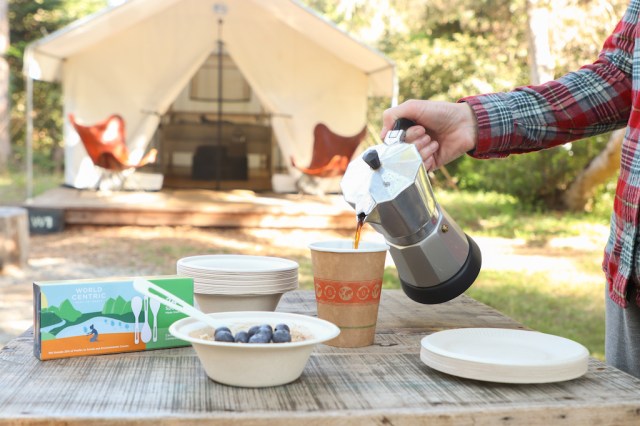There’s no better time than now to head into nature, pitch a tent and sleep under the stars. Camping is one of the best ways to disconnect from your screens, and reconnect with the outside world. In doing so, it’s important to protect and preserve wild spaces for future generations to enjoy. Camping sustainable means minimizing your impact on the environment around you and leaving no trace.
Here are some recommendations for making your next camping adventure as sustainable as possible:
1. Gear: Buy Used Gear, Borrow & Donate
If you don’t camp more than a few times a year, try borrowing or renting gear rather than buying your own. If you have your own gear and it’s older or damaged, reach out to the manufacturers to inquire about repair programs. When I look for “new to me” equipment, I check used online marketplaces, it’s amazing how many people camp or hike only a few times and then decide to sell their equipment.
2. E-waste & Fuel: Bring Rechargeable & Solar Products
When you are in the market for a new lantern, look for one that is rechargeable or solar powered—or best yet, both! In this way you can avoid the use of non-rechargeable batteries. You can find rechargeable headlamps, speakers, and charging blocks to help you avoid battery waste. One pound propane tanks are popular for small camp stoves and grills, but the resulting single-use canisters are hazardous waste. Refillable small propane tanks are more difficult to find, but if you live in an area serviced like Little Kamper or another similar company, take advantage of the ability to avoid waste.
3. Food: Minimize Packaging
Pack your food in reusable containers rather than relying on small packaged goods. Try chopping your fruits and vegetables in advance if you can, so you can compost the food scraps at home. If you’re eating meals on reusable dishes and have to wash them in the wild, be mindful of the soap you’re using. Standard dish detergent is hard on the environment. Bring biodegradable soap, and keep it at least 200 feet away from natural water sources.
Opt for compostable tableware like from World Centric, including plant-based plates, cups, bowls, cutlery and more can make campsite eating a little easier. Just be sure to properly bag and pack out all of your compostables and food scraps, and leave no trace.
4. Stay Local
You don’t have to travel far to get offline, and you may be surprised at the beautiful open spaces that are right in your own backyard. Camping locally reduces the distance you have to travel, thus reducing your emissions. It can also help you better explore your own surroundings and community. During the height of the pandemic when travel was more restricted, I found the best remote campsite just a couple hours from my home. My county parks’ campgrounds offered a great easy car camping experience within minutes from my house.
5. Build Responsible Campfires
If you see a fire ban in place where you’re camping, it exists for a reason. This year has been one of the hottest and driest years on record in many parts of the world. With dry seasons comes the risk of wildfires, so please respect these bans. Keep campfires where permitted and contained to fire pits, and never burn toxic materials like trash, paperboard or anything plastic.
6. Respect the Wildlife
When hiking, going off-trail can be harmful to plants and animals. Be sure to stay on the trail and leave rocks and other artifacts where they are. If you encounter wildlife while hiking or camping, keep your distance for your own safety and theirs. Never leave food out around your campsite overnight, as it can attract animals.
7. Use Refillable Water Jugs & Bottles
Skip buying prefilled single-use water bottles or gallon jugs of water. Bring reusables and refill your own. You can pack enough filled bottles with what you anticipate needing, or invest in a water purifier.
8. Reduce Gross Waste
It’s not fun to talk about, but toilet paper is a source of litter at parks and recreation areas. Avoid using toilet paper in the wild by investing in a small refillable bidet, and for women, buying a reusable antibacterial cloth. Always bury your waste and compostable toilet paper (if using) according to local guidelines, which usually include burying it at least six inches deep and 200 feet from water.
RELATED STORIES:
